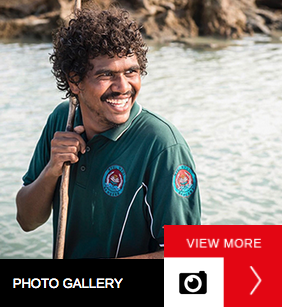KLC pays tribute to Green Army rangers
Nov 23, 2017
More than 30 Indigenous rangers have lost their positions due to the axing of the Federal Government's Green Army program.
The Kimberley Land Council has paid tribute to the more than 30 Indigenous rangers who will leave the organisation’s ranks, following the end of Green Army funding this month.
The axing of the Federal Government program will mean the loss of one third of the Indigenous rangers hosted by the Kimberley Land Council and more than half of the KLC’s women rangers.
Six Kimberley Ranger Network groups have been impacted, such as the Kija rangers who are based at Warmun Community and will have their team reduced from eight rangers to just two. The Bardi Jawi Oorany women’s ranger team, based at One Arm Point, has been reduced from seven rangers to one.
The Kimberley Ranger Network employs Indigenous land and sea managers to undertake cultural and natural resource projects to improve and enhance the unique biodiversity and cultural values of the region.
The network is facilitated by the Kimberley land Council and currently comprises 14 Indigenous ranger groups located all across the Kimberley.
KLC Deputy Chief Executive Officer Tyronne Garstone this week thanked the rangers for their commitment to working on country and caring for country.
“Since working as rangers, these young men and women have become leaders in their community,” Mr Garstone said.
“The rangers have developed skills, employment experience and had important opportunities to learn from elders about culture and country.
“For many, this program provided employment in remote communities where jobs don’t exist, allowing people to leave the welfare system and take control of their income.
“These achievements are inspirational and something all of the rangers employed under Green Army should be proud of.
“It is disappointing to lose these positions and see people forced back into the welfare system, rather than working on country as rangers.”
Kimberley Ranger Network groups impacted by the Green Army funding cuts include, Karajarri, Bardi Jawi Oorany, Kija, Ngurrara, Nyul Nyul and Nyaliga rangers.
Mr Garstone said the Green Army program, while not perfect, did provide scope for the expansion of ranger groups struggling to access additional funding, despite the often restrictive nature of the program. It also provided important start-up funding to set up new women’s ranger teams, many of which will now be dismantled.
“What this highlights is the ongoing need for funding for Indigenous rangers through the programs we know that work – the Working on Country and Indigenous Protected Area programs,” Mr Garstone said.
“Indigenous ranger jobs are real jobs that deliver real outcomes and should be provided with long-term certainty and adequate funding into the future.”




